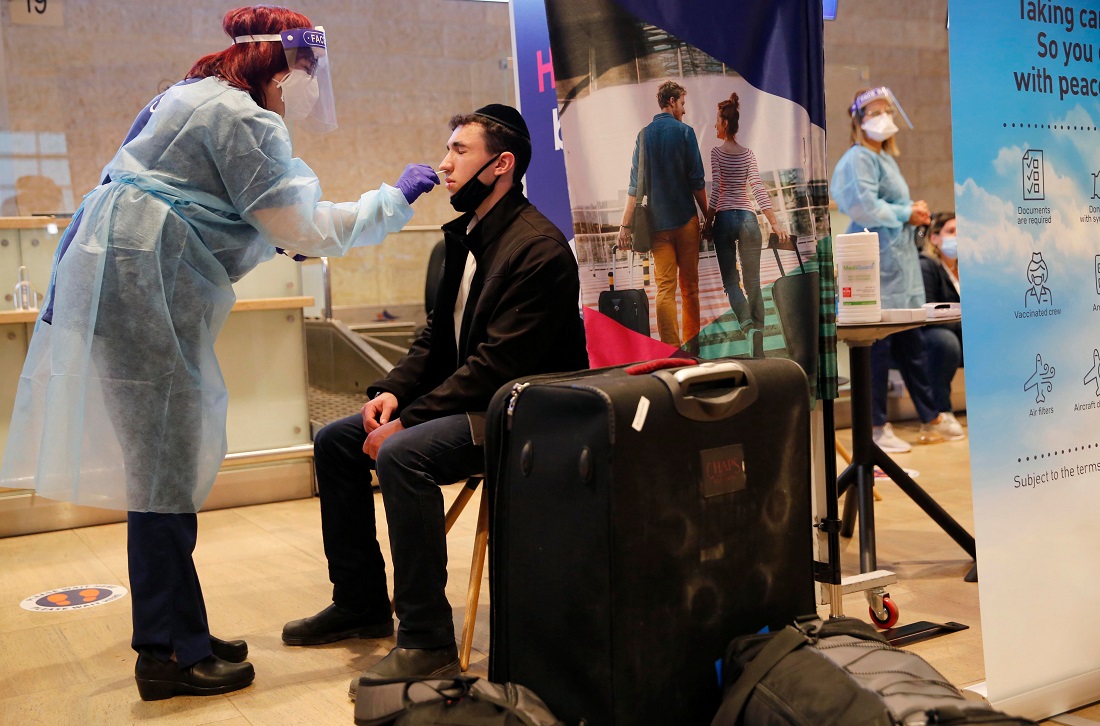How the SYN-RG-Ai team established and implemented a long-term plan to manage international transitions during a national crisis
After deeming Israel’s Ben Gurion Airport as a “significant national weakness,” in July 2021, Israeli Prime Minister, Naftali Bennett, appointed SYN-RG-Ai Co-Founder, Maj. Gen. (res.) Ronny Numa, to the position of Ben Gurion Airport’s COVID Commissioner.
The SYN-RG-Ai team, headed by Numa and Col. (res.) Avi Cohen, were tasked with finding an immediate solution for the airport’s international transitions system, and to generate a long-term national plan for managing transitions during global crises.
The Challenge
Crisis analysis, planning and establishing an appropriate team
To ensure successful crisis management, SYN-RG-Ai’s first challenge was to establish a diverse, multidisciplinary team, with the required experience and capabilities to handle the operational, technological, regulatory and information-related aspects of a national crisis.
The SYN-RG-Ai team determined that a key factor in effectively handling the pandemic, is that the crisis will only be dealt with in cooperation between all relevant government ministries – Ministry of Health, Ministry of Transport, Ministry of the Interior, Ministry of Homeland Security, and the Ministry of Justice. As a result, the International Transitions team, headed by SYN-RG-Ai, was comprised of representatives from each of these government bodies.
SYN-RG-Ai team’s main objective was to generate and promote practical solutions to crisis management, while ensuring significant inter-ministerial cooperation and coordination. While the team’s tasks and activities were planned for the short-term, it was imperative that the role of government ministries in managing national crises will continue even after the team concluded its work.
Phase 1: Crisis Analysis – Identifying Weak Points
The first phase consisted of an immediate and in-depth crisis analysis to identify the weak points in the system that required timely and effective solutions. As part of their analysis, the team quickly identified a critical issue, the imminent need to improve the passenger arrival process at the airport terminal. It was vitally important to accelerate the delivery of passengers’ COVID test results and ensure the process be carried out efficiently in less than 24 hours. This initiative required the cooperation of all stakeholders in the process – the private company managing the COVID testing/sampling, the Ministry of Health responsible for the test labs, Israel’s HMOs and the Ministry of the Interior.
The Result: Approximately two weeks after the various onsite teams got to work, the testing process significantly improved, with the vast majority of test results provided to passengers and the Ministry of Health in all cases, less than 16 hours, while in others, in even less time.
Phase 2: Generating a Long-Term National Plan
The second phase consisted of creating a detailed long-term national plan and building the national infrastructure required for appropriate crisis management.
Following the extensive review and analysis process in Phase 1, SYN-RG-Ai’s International Transitions team defined five key objectives, whereby each objective is focused at the inter-ministerial level within the framework of the national plan:
- Establish a dedicated policy for international transitions during a pandemic, coordinated with various government ministries
- Manage and regulate the relevant airport data systems
- Promote information efforts to the public via various platforms regarding international transitions
- Strengthen enforcement efforts by enforcing quarantine regulations for passengers arriving from abroad
- Integrate advanced technologies to significantly affect Israel’s ability to effectively handle the challenge of managing international transitions during a pandemic
The Result: A detailed, long-term national plan was presented to Prime Minister Bennett and was approved. Milestones for implementing the plan were established and a nationwide exercise was planned to ensure its implementation by the various government ministries.
The Results
Crisis management – routine situation assessments
The SYN-RG-Ai team were able to quickly and effectively show that the most critical factor in crisis management is ongoing, routine assessments and discussions with all relevant stakeholders.
Immediately following initiation of the national plan, the process of creating and implementing timely and trusted updates was established. This included all relevant parameters, such as daily passenger traffic data, passenger morbidity, reliable COVID testing processes for all passengers, efficacy of criminal enforcement actions on quarantine, and the necessary data to benefit government policy formulation and guidelines.
Situation assessment meetings were held every week, where operational data was presented, relevant processes were analyzed, and guidelines were provided. Following each meeting, a summary report was forwarded to all relevant team members and government ministries. During the entire process, SYN-RG-Ai’s International Transitions team worked in close collaboration with all government representatives, that in turn, led to successful implementation of the long-term national plan.
References:
- How do European countries manage to deal with the Corona crisis?, Corona National Information and Knowledge Center, 12.04.2020
- What can be learned from the management of quarantine in China? Broadcasting control and calm and reducing crowds, with the help of local authorities and private companies, Corona National Information and Knowledge Center, 29.03.2020
- ‘Moreh Nevuchim’ to manage the Covid-19 situation in the local authorities, Magen Israel project, November 2020

